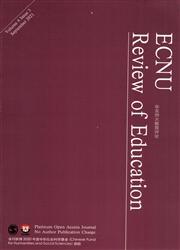Distinguishing Intuitive and Deliberative Reasoning Regarding Different Aspects of Science Classroom Discourse
IF 2.7
Q1 EDUCATION & EDUCATIONAL RESEARCH
引用次数: 0
Abstract
The current study aimed to identify the distances between a science teacher's intuitive reasoning and researchers’ systematic analysis of various aspects of science classroom discourse. An expert science teacher, given the pseudonym Jake, engaged in self-reflective processes regarding different aspects of classroom discussions to assess the variations and similarities between the teacher's intuitive estimations and the researchers’ data-based reasoning. Data collection involved in-depth interviews and video recording. Six aspects of science classroom discourse were considered to elucidate the distances: structure, interactional pattern, verbal sequence, typology, cognitive demand, and communicative approaches. The quantitative distances between Jake's estimations and systematic observations of the six aspects of science classroom discourse varied across different aspects of the observed science lesson. While no consistent pattern was observed in the distances, there were increasing and decreasing gaps between the different aspects of science classroom discourse. Considering the contemporary arguments on human cognition and the professional development of science teachers, potential reasons for the differences were explored. Educational recommendations were provided, particularly regarding supporting science teachers’ journey toward becoming reflective inquirers or researcher-teachers.就科学课堂话语的不同方面区分直觉推理和慎思推理
本研究旨在确定科学教师的直觉推理与研究人员对科学课堂话语各方面的系统分析之间的距离。一位化名为 Jake 的科学专家教师对课堂讨论的不同方面进行了自我反思,以评估教师的直觉估计与研究人员基于数据的推理之间的异同。数据收集包括深度访谈和录像。研究人员考虑了科学课堂讨论的六个方面,以阐明两者之间的距离:结构、互动模式、语言顺序、类型、认知需求和交际方法。杰克对科学课堂话语六个方面的估计与系统观察之间的量化距离在所观察的科学课的不同方面有所不同。虽然没有观察到一致的距离模式,但科学课堂话语的不同方面之间的差距有增有减。考虑到当代关于人类认知和科学教师专业发展的争论,我们探讨了造成这些差异的潜在原因。研究还提出了一些教育建议,特别是关于支持科学教师成为反思探究者或研究型教师的建议。
本文章由计算机程序翻译,如有差异,请以英文原文为准。
求助全文
约1分钟内获得全文
求助全文
来源期刊

ECNU Review of Education
Social Sciences-Education
CiteScore
4.90
自引率
0.00%
发文量
41
审稿时长
10 weeks
 求助内容:
求助内容: 应助结果提醒方式:
应助结果提醒方式:


